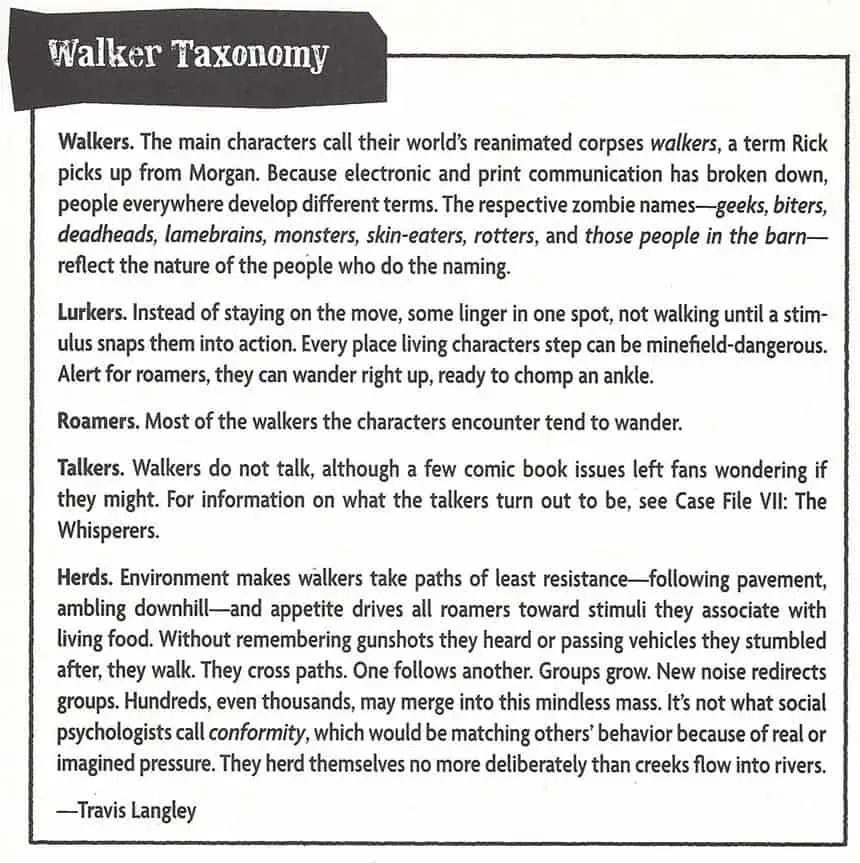Monsters have always been a part of lore for humanity. From vampires to witches and more, it seems you can’t turn around these days without bumping into the latest craze in monster fiction — zombies. From comics to TV shows to video games to zombie walks and runs, there’s no denying that zombies have become entrenched in today’s fiction.
One of the biggest zombie phenomenons of the past few years is the undeniable popularity of AMC’s The Walking Dead based on the comic series of the same name by Robert Kirkman. Just in time for the spin off Fear the Walking Dead and just ahead of the upcoming sixth season of The Walking Dead, a book edited by Travis Langley, Ph.D. has been published which examines the psych of the cast of the comic series/TV show. Our review takes a look at the 19 essays contained within, and how they help us better understand life in a post-apocalyptic zombie world. It should be noted as well that this book is an unauthorized collection of essays and has nothing to do with the creators of the comic series or show itself.
I’ve always been a fan of books and articles that analyze popular culture and give deeper insight to movies or TV series that most people glaze over as entertainment without thinking about the deeper ramifications or parallels with modern day life. The Walking Dead Psychology starts off with a fantastic foreword by none other than John Russo, co-creator of Night of the Living Dead — the 1968 zombie movie that arguably brought more mainstream attention to the plight of the living dead.
Russo mentions that his drive to create a more evolved zombie — one that feasts on human flesh — arose out of the lack of “heavyweight fright material” in previous zombie flicks. As he says, “that did the trick” and and struck “an intense element of fear that probably goes back to eons ago, when we were daily prey for wild beasts.”
Russo goes on to mention that while Night of the Living Dead took place in an isolated farmhouse, it hinted that the zombie epidemic was happening all over the U.S.. The Walking Dead takes this one step further, and turns out to be the same theme Russo tried to convey in Night of the Living Dead, and that what makes both his movie and the AMC TV series isn’t just the zombies themselves, but in the fact that they both explore the possible reactions of real people should such a catastrophe unfold.
A compelling zombie story must have the same elements as any other successful story, and The Walking Dead has them,” Russo writes. “It has intriguing, believable characters whom people care about. It has well-developed plots and subplots. And it has important things to say about the human condition, which is one of frailty and nobility, weakness and courage, fear and hope, good and evil. These are the enduring puzzles and enigmas of our existence, and we can delve into them and learn from them vicariously when we sit down to watch The Walking Dead.
So just how would a world-wide zombie outbreak affect humanity? As I made my way through this book, I also started watching Fear The Walking Dead. In some ways, this “prequel” series gives viewers a bit more insight into just how people would potentially react in such a situation, while in The Walking Dead we don’t really get to see exactly what the characters went through during the outbreak as the show is centered around what is happening after the outbreak. I only mention it because the actions and attitudes so far from the characters in Fear the Walking Dead lend some extra weight to the essays and analysis present in The Walking Dead Psychology.
The book is broken into five main sections: Waking, Responding, Dying, Walking, and Living, each with three or four essays by various psychologists, forensic examiners, writers, biologists, and other professionals which examine different aspects of a zombie outbreak. Travis Langley himself is a professor of psychology and regular speaker on the subjects of heroism and pop culture at psychology conferences and fan conventions. He also has an online column called “Beyond Heroes and Villains” over at PsychologyToday.com, and has a great interest in psychology as it relates to pop culture.

I’m not going to go into great detail here, but each of the sections is well represented with the essays contained within. The essays in the Waking section cover topics like how The Walking Dead invokes an array of complicated feelings, takes a look into the neurobiology of “Walker Dysfunction Disorder”, a.k.a. could it really happen?, and then finishes up with a look at the male role and masculinity in such a world.
Responding follows up with a look at what fear does to humans, what killing a zombie would do to a person psychologically, a look at the diversity present in The Walking Dead, and finally a very good look at Maslow’s Hierarchy of Needs and how it is applied in the TV series.
The third section, titled Dying, takes a look at group identity and then causes and consequences of stress on the human body living in such an environment before going into one of my favourite chapters in the book: “It’s the Humans You Have to Worry About: Becoming a Sociopath.” Finally, this section wraps up with a look at Carl Grimes and how even though they are the next generation, the youth in situations like this are often neglected and forced to grow up quickly, robbing them of an all too important childhood.
Next up is Walking, which covers topics such as survivor’s guilt, how prolonged exposure in such an environment can lead to traumatization, a look at defense mechanisms based on the writings of Sigmund Freud, and the roles and systems that come into play within a survivor group in order to ensure survival.
The last section, aptly titled Living, starts off with an essay that asks the question that everyone who’s watched the show wonders: “What Would You Do?” Using existential psychology, this essay examines how humanity has the ability to find meaning in our lives even when confronted with extremely dire circumstances and events. Next up is an essay that takes a look at Daryl Dixon and how events like those in The Walking Dead can transform people into different roles than they grew up with, in the case of Dixon from hillbilly to hero. And lastly, the final essay in the book examines finding your purpose in a zombie apocalypse.
Interspersed between the essays are Case Files that take a look at specific characters in the show and analyzes their behaviour and actions to try and get a better understanding of their personalities and what drove them to be what they have become. The book contains case files on Shane Walsh, Thomas Richards, The Governor, Gareth, The Claimers, Negan, and The Whisperer’s. Each case file gives the reader a nice cross section on the different character types present in the show. Oddly missing though is a Case File on Rick Grimes himself, and although he and his actions are mentioned throughout the book it would have been nice to see a more specific psychological analysis on the main character of the series.
The essays in The Walking Dead Psychology: Psych of the Living Dead are well written and cover a vast array of topics. The addition of the individual case files and the injection of sidebars like “The Rules,” “Walker Taxonomy,” “Psychopathy Checklist,” and more really flesh out the book and provides some great insight into one of the most popular shows on TV right now. If you watch The Walking Dead and are even only a little bit interested in delving deeper into the show, you owe it to yourself to pick up this collection of essays examining the psychology behind the show.
[button type=”link” link=”http://amzn.to/1gmqV53″ variation=”btn-danger” target=”blank”]Purchase from Amazon[/button]***We were sent a review copy of The Walking Dead Psychology: Psych of the Living Dead for the purposes of this review.
Last Updated on January 12, 2019.










